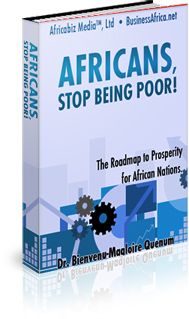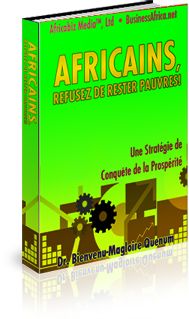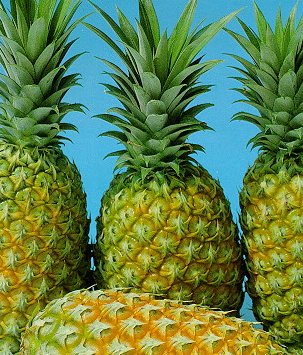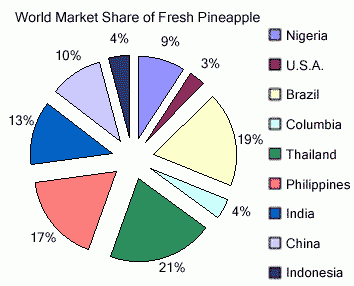|
****JavaScript based drop down DHTML menu generated by NavStudio. (OpenCube Inc. - http://www.opencube.com)****



|
| ! |
| AFRICABIZ
VOL 1 - ISSUE: 42
OCTOBER
15 - NOVEMBER 14, 2002
Previous
Issue
Editor: Dr. Bienvenu-Magloire
Quenum
Click here for contact & support console
| | A
WORD FROM THE EDITOR
| | |
|
Dear visitor and international investor,
We
warmly welcome you, if this is
your first visit to Africabiz
Online - The ultimate newsletter
on trading and investing in 49
sub-Saharan African countries.
If you are a regular and faithful
reader, welcome back.
If you are a regular and faithful reader, welcome
back.
-
WAR AGAINST TERRORISM STARTS AND ENDS UP WITH BATTLE AGAINST
POVERTY
One year ago, on September 11, 2001, the world was
astounded and shaken by the airliners suicide bombings on the Twins at New York
City and the Pentagon at Washington, DC
The United States of America
hit back and rained Afghanistan with bombs to retaliate against the masterminds
of the airliners suicide attacks. The bombs and the armada gathered to carry out
the military campaign (troops carriers, warships, ammunitions, etc.) represent
a lot of money.
We do not know how much yet. Certainly in the range
of several billions US$.
We do know now, however, how much the 1991
Gulf war cost to the formidable international coalition built up by president
George Bush Sr. to rout out Saddam Hussein troops from Kuwait.
According
to the US Department of Defense the Gulf war cost stands at US$ 61 billion. Click
here for more. However, the amount released by other sources is higher. On
September 28, 2002 Saudi's Interior Minister Prince Naif declared: " The Saudi
Arabia had bankrolled the US-led 1991 Gulf war to the tune of US$ 80 billion...."
Click here
for more.
Owing to the fact that several European Union countries (Germany;
France, Italy and the United Kingdom in particular) also contributed significantly
to the war financing, one can say that the total cost of 1991 Gulf war is far
beyond US$ 100; and likely to be near US$ 150 billion. That's for the direct costs
only.
To that one has to add "collateral" damages' costs such the Arabian
/ Persian Gulf's oil pollution, the repairs of Kuwait's oils wells set ablaze
by Iraq. Etc. Iran for instance evaluated the collateral damage caused by the
Iraqi occupation of Kuwait to US$ 23 billion, including US$ 15.4 billion in the
sector of natural resources, agriculture and fishing, Click
here for more.
There are also the formidable social and welfare
costs bore by the Iraqi population and the worldwide damages done to the international
tourist industry and the insurance sector business to name the few. Etc.
Taking all that into account one can conservatively say that the 1991
Gulf war cost is something in the range of US$ 250 billion.
A staggering
amount of money you would certainly agree! What a waste of money. A complete squandering
of financial means, which could have been allocated to building a better world
for the entire humankind
One year ago, in October 2001 email edition,
on the aftermath of the September 11, we wrote: "THERE IS EVERYTHING UNDER THE
SUN FOR A BETTER WORLD" and demonstrated here
that the amount of financial means necessary to lifting an African developing
country from the "poverty league" of GNP 300 US$ / year to "bearable living conditions
league" of GNP 2,500 US$ / year is only US$ 200 million per year over a period
of maximum 10 years.
In other words, the amount of financial means
necessary to initiating a development program to stem out poverty and diseases
from 48 sub-Saharan African countries and establish an era of general prosperity
is far less than the cost of 1991 Gulf war. - approximately US 150 billion
over 10 years; that is to say US$ 15 billion per year of well planned and implemented
investment thrust.
-
REASONS BEHIND TERRORISM: POVERTY, OPPRESSION AND LACK OF
CONSIDERATION
Now, in year 2002, 10 years after the Gulf
war, war drums noises are becoming louder and louder again, in Washington, DC
and London's governing circles.
Under the official cover of fight against
terror / terrorism, hawk political leaders are lobbying hard for the support of
the international community for a preventive military strike against Iraq. If
they succeed in their bid, staggering amount of money and much needed financial
means will be squandered again in purchase for and utilization of military hardware,
weapons and lethal bombs; instead of invested in research and development to fighting
AIDS / HIV, improving agriculture cultural conditions in tropical countries, creating
infrastructure (roads, bridges, hospitals) establishing schools and universities,
agribusiness concerns. Etc. .
It is really sad to see these people who
pose as defenders of "the civilization" and who are supposed to be "the
leaders" of the world behave like chaos mongers.
These Neros
are supposed to be in charge of the most advanced economic countries in the world
and they do not see the benefit of creating worldwide harmonious conditions for
sustainable economic development. Instead they are falling all over themselves
to creating havoc.
They do not see that lifting poor countries from
abject living conditions to better ones will make them richer psychically and
financially.
Indeed one can say that the obtuse blindness of the developed
world's leaders is not only counterproductive but self destructive. It is obvious
that the more developed the actual Third World becomes, the more prosperous the
actual Developed World. New developed countries will buy equipment, machinery,
fertilizers, medicines etc.; from old developed countries; and sell them back
all kinds of commodities and goods. International trade will doubtless be boosted
up. We will then live in a new era of tremendous crisscross exchanges and win
win game for every nation involved.
Let us remind the hawks leaders
of the world that the real reasons behind terrorism read as follows : poverty,
oppression and lack of consideration.
Individuals of all nations
and races engulf in abject poverty may become and do become puppets and slaves
in hands of devious manipulators. For peanuts they are ready to carry out the
most unthinkable action planned by their masters.
People who are living
under an apartheid regime; with their dignity daily challenged and trampled down
by a powerful oppressor may recourse to drastic actions to fight back in order
to make their plight known to the world at large.
Those nations, which
are looked down upon by the power of the day may have no other mean to attract
attention to their desperate global economic situation than staging non conventional
political actions bordering terrorism.
So, to stem out terrorism,
corrections and durable solutions should be found for poverty, oppression of all
kinds and lack of consideration to the less developed of the world.
That is a daunting task, which will require dedication from humanitarian leaders
capable of acting without their eyes riveted on opinion polls. A right, wise and
good leader should have vision, lead his people with a sound moral ethic and not
behave like irresponsible common folks.
Contributor's Guidelines are
here to review. Your contribution
on "How African countries / entrepreneurs could bridge the developing gap" is
welcome.
Many thanks
for dropping by and see you here on November 15, 2002
Dr.
B.M. Quenum
Editor
of AFRICABIZ

| | | |
BUSINESS
OPPORTUNITIES IN AFRICA
| |
- Several
business opportunities with high profit making potential, which are economic
catalysts and components to the Strategy for African Countries - here
available - have been introduced to you. They are listed in following table.
| a-
SHEA BUTTER (Issues 5, 6,
7, 11,
12, 13)
b- BLUE GOLD (Issues 14,
15, 16,
17, 18,
19)
c- FREEZE-DRIED
PAPAIN (Issues 20, 21,
22 and here)
d- KENAF (Issues 23,
24)
e- VEGETABLE OIL
(Issues 25, 26,
27 and 28)
f- CEREALS (Issues 30,
31, 32,
33)
g- FRUITS (34,
35, 36,
37, 38,
39, 40)
|
-
TROPICAL FRUITS INDUSTRY AS INCOME BUILDING POWER FOR AN
AFRICAN COMMUNITY / PART
VIII : INTRODUCTION TO PINEAPPLE AGRIBUSINESS
In this delivery we continue our series on tropical fruits industry with pineapple
agribusiness as income building power for an African community.
Pineapple
is a member of the Bromeliaceae's family, which comprises about 2,000 species.
Its botanic name is Ananas comosus Merr.
-
ONE OF THE LEADING COMMERCIAL FRUIT CROP OF THE TROPICS
 Currently
pineapple is one of
the leading commercial fruit crops of the tropics. It is present
on the food marketplace
as: 1- Fresh
pineapple.
2- Canned
pineapple
and 3- Bromelain
(a proteolytic enzyme - similar to papain - obtained from pineapple juice. It
is used as meat tenderizer, beer additive, stabilizer for latex paint, leather
tanning ingredient, nutritional supplement .Etc.). Currently
pineapple is one of
the leading commercial fruit crops of the tropics. It is present
on the food marketplace
as: 1- Fresh
pineapple.
2- Canned
pineapple
and 3- Bromelain
(a proteolytic enzyme - similar to papain - obtained from pineapple juice. It
is used as meat tenderizer, beer additive, stabilizer for latex paint, leather
tanning ingredient, nutritional supplement .Etc.).
The waste obtained
from the processing of fresh pineapple to fruit juice is also an excellent
animal feed.
The leaves and vegetal crop wastes (ten times the weight of the fresh fruit)
can be processed - at the end of the plantation cycle - into ensilage for animal
feed. In that case it is an absolute necessity to lower to bearable amount the
percentage of pest control chemistry' presents in the leaves. Otherwise the animal
feed produced may proved to be toxic. Pineapple
plant's leaves are also raw material for textile
fibers
similar to sisal plant's fibers. Fibers from pineapple plant's' leaves are "short"
fibers compared to the "long" fibers generated by sisal plant.
Fresh pineapple fruit can also be processed into diced dried
fruit
to be mixed with other dried tropical fruits (guava, mango, banana, papaya. Etc.)
for the very lucrative tropical dried fruits' appetizer / drink market.
There is also a ready market for candied pineapple.
|
World Production
of Fresh Pineapple 1994 - 1998 |
| Production
( x 1,000 Metric Tons) |
| Countries |
1994 |
1995 |
1996 |
1997 |
1998 |
|
Africa |
1,864 |
1,950 |
1,987 |
2,010 |
1,997 |
| Nigeria |
800 |
800 |
800 |
800 |
800 |
| Kenya |
270 |
270 |
270 |
270 |
300 |
| Cote
d' Ivoire | 205 |
217 |
251 |
261 |
227 |
| South
Africa | 80 |
147 |
134 |
152 |
140 |
| Dem.
Rep Congo | - |
149 |
145 |
1140 |
135 |
| Tanzania |
73 |
73 |
74 |
73 |
74 |
| Guinea |
67 |
67 |
65 |
67 |
72 |
| Others |
369 |
227 |
248 |
247 |
249 |
| North
and Central
America |
1,220 |
1,303 |
1,311 |
1,299 |
1,383 |
| South
America |
1,715 |
2,151 |
2,372 |
2,716 |
2,359 |
| Asia |
6,635 |
6,746 |
6,561 |
6,698 |
6,266 |
| Europe |
2 |
2 |
2 |
2 |
2 |
| Oceania |
182 |
154 |
151 |
151 |
145 |
| Australia |
157 |
128 |
125 |
125 |
123 |
| Others |
25 |
26 |
26 |
26 |
22 |
| World
Total |
11,618 |
12,306 |
12,384 |
12,876 |
12,152 |
|
Source:
FAO | -
AFRICA CAN DO BETTER AND GRAB A BIGGEST MARKET SHARE  Table
above shows that Africa production represents more or less 16% of fresh pineapple's
World Production; with Nigeria being the major player. Table
above shows that Africa production represents more or less 16% of fresh pineapple's
World Production; with Nigeria being the major player.
Africa production
of fresh pineapple is less than Thailand output, which accounts in Year 2001 for
21 % of world production (down from a pick of 27% in the 1970's).
The
bulk of African production is from Nigeria,
Ivory Coast, South
Africa, Kenya. Etc. It
is sold on the world market as fresh fruit, except for South Africa and Ivory
Coast which sell also canned pineapple. However, Africa's pineapple canned
industry is globally marginal compared to the world market as shown on table below:
| Africa's
Production of Canned Pineapple
Versus Other / World Production 1889 - 1998 |
|
(In
'000 cartons 24/2) |
| |
1989 |
1990 |
1991 |
1992 |
1993 |
1994 |
1995 |
1996 |
1997 |
1998 |
|
Ivory Coast |
209 |
196 |
174 |
201 |
191 |
205 |
217 |
251 |
261 |
227 |
| South
Africa |
252 |
197 |
163 |
187 |
143 |
80 |
147 |
134 |
152 |
148 |
| Other
World |
9,763 |
9,643 |
10,512 |
10,737 |
11,741 |
11,772 |
11,949 |
12,065 |
12,329 |
12,109 |
|
Total
World |
10,194
|
10,036
|
10,849
|
11,125
|
12,075
|
12,057
|
12,313
|
12,450
|
12,742
|
12,484
| |
Source:
FAO | -
PINEAPPLE AGRIBUSINESS IS A REAL INCOME BUILDING POWER FOR AN AFRICAN COMMUNITY
Pineapple agribusiness,
if well planned and organized, can be a tremendous Income
Building Power for an African community. Pineapple agribusiness leads to the
following non restrictive economic activities:
| - Fresh
fruit industry.
- Dried fruit industry.
- Fruit juice industry
- Animal
breeding.
- Soft wine industry.
- Textile and knitting industry
- Pharmaceuticals.
Etc. | There
is no doubt, in view of above listed economic activities, that pineapple agribusiness,
well planned and integrated into the development scheme of an emerging country,
will play a major role in activating the economy and significantly contribute
to the Synergetic
Impact Factor.
-
DOOR TO ENTERING THE MARKET IS PERMANENTLY OPENED
In year
2000, tropical fruits export
value worldwide
(98% originating from developing countries) was about US$
36 billion. For
a global 61.4 million metric tons of production, mango accounted for
about 36 percent of output, followed by pineapple
at about 22 percent,
papaya at 14 percent and avocado at 4 percent. Data for year 2001 indicate an
estimated 4 percent increase in world output of tropical fruits to reach 63.4
million tons. Furthermore, according
to statistics compiled by the FAO,
the international market of pineapple is expected to rise by 35% over the period
1995-2005
The European market is the leading market, with 40% of
total imports of fresh and canned pineapple, followed by the United States and
Japan. Main suppliers to the European market are Cote
d'Ivoire and Costa Rica. Ghana
is developing marketing efforts to enter the European market. The country tripled
its supply between 1993 and 2000 from 10,500 metric tons of fresh pineapple to
35,000..
The main hindrance
for pineapple originated from Africa to grab a biggest market share worldwide
- and particularly in Europe - is the cost of transportation
from producing countries to the European marketplace.
Ship / cargo transport is normally the less costly dispatching mean to Europe.
However, it is difficult for African exporters to book cargo shipment to Europe.
They are obliged to opt for air freight, which is more expensive. Even
then they cannot book for large shipment.
Therefore. African producers
need absolutely to concentrate on the management
of the costs of production. They need to produce at less cost in order to
compensate for the high cost of air freight.
To be competitive on the international marketplace they have to produce high
volume yields of fresh pineapple for less operational costs (they have to establish
good balance of hands and machinery equipment; perform strict control of
purchasing cost and per hectare utilization of fertilizer; put in place efficient
irrigation system; select good brand of pest control products and make moderate
use of them. Etc.)
In
next issue N� 43, investment estimate
to establishing one hectare
of pineapple plantation will be described.
- Interested parties - private African and international investors /
companies, government
agencies,
international development
agencies - to make contact through the Free Access Support Console available at this link
Contact through the support console will get quickest reply from Africabiz Online's staff, than contact by emails. Click here for contact information. Be advised that first contact should be through the support console to be followed by phone calls. If you are a VIP-Member, use VIP-Members Support Console available here.
Before you consult please click
here to review this clarification
| |

